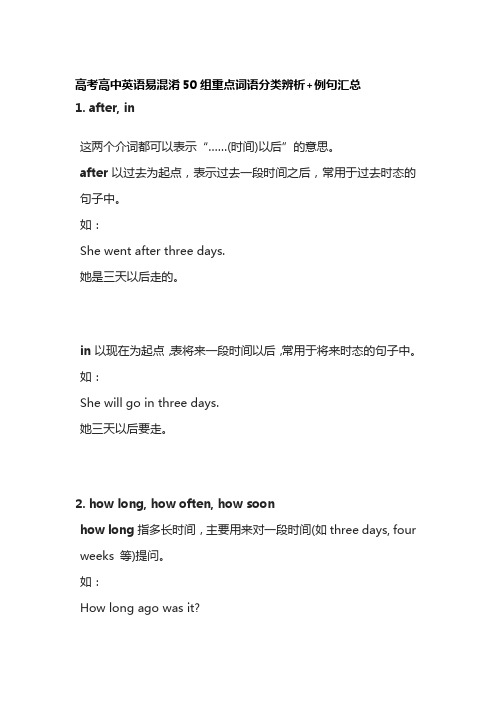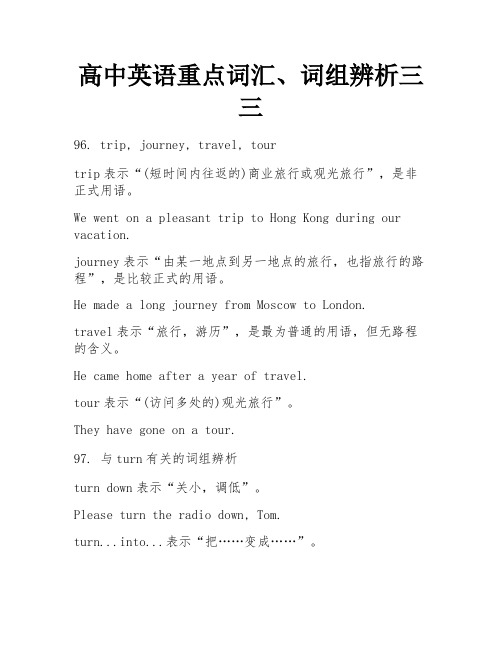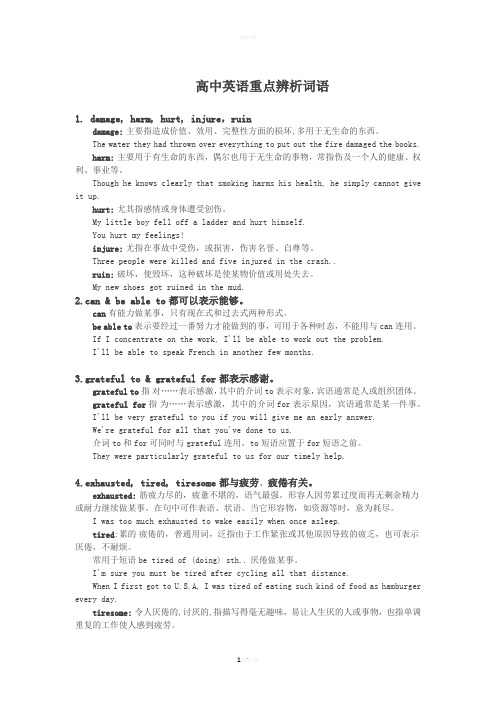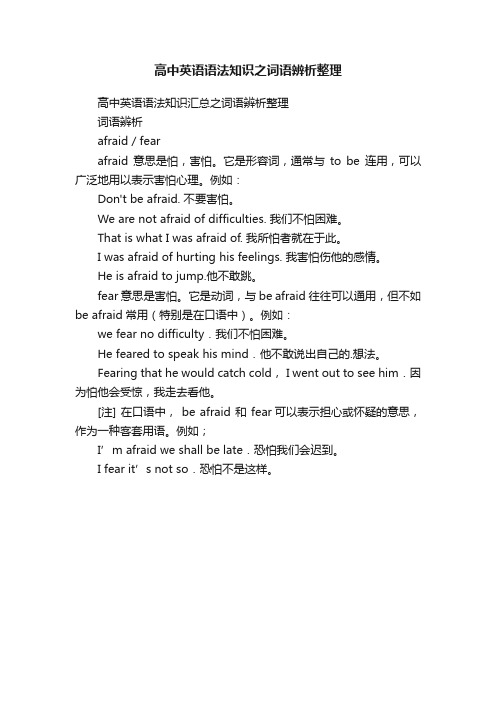高中英语重点词汇、词组辨析(非常好)
高考高中英语易混淆50组重点词语分类辨析+例句汇总

高考高中英语易混淆50组重点词语分类辨析+例句汇总1. after, in这两个介词都可以表示“……(时间)以后”的意思。
after以过去为起点,表示过去一段时间之后,常用于过去时态的句子中。
如:She went after three days.她是三天以后走的。
in以现在为起点,表将来一段时间以后,常用于将来时态的句子中。
如:She will go in three days.她三天以后要走。
2. how long, how often, how soonhow long指多长时间,主要用来对一段时间(如three days, four weeks 等)提问。
如:How long ago was it?这是多久前的事了?how often指每隔多久,主要用来对频率副词或状语(如once a week等)提问。
如:—How often does he come here? —Once a month.他(每隔)多久来一次?每月一次?how soon指再过多久,主要用来对表示将来的一段时间(in an hour, in two weeks 等)提问。
如:How soon can you come?你多快能赶来?3. few, a few, little, a little, several, somefew 和little的意思是否定的,表示“很少”或“几乎没有”;而a few和a little的意思是肯定的,表示“有一些,有一点儿”。
few 和a few修饰可数名词;little 和a little 修饰不可数名词。
several用于修饰可数名词,语意比a few和some更肯定,含有“好几个”的意思。
some可修饰可数名词,也可修饰不可数名词,从数量上说,它有时相当于a few 或a little,有时指更多一些的数量。
4. the other, anotherthe other指两个人或事物中的“另一个”,表示特指。
高考英语重点词汇辨析和易错词汇介绍

高考英语重点词汇辨析和易错词汇介绍英语学习的基础是掌握词汇,为了帮助大家更好的掌握一些英语词汇,下面店铺的小编将为大家带来高考英语的重点词汇辨析,希望能够帮助到大家。
高考英语重点词汇辨析1.accuse / chargeaccuse 和charge都有“指责,控告”之意,有时可通用,但结构不一样。
accuse不一定针对重大过失或罪行,其结构为accuse sb of sth。
而charge一般用于重大过失或罪行,其结构为charge sb with sth,此结构还有“使某人负有……责任”之意。
例如:例1:My father accused me of my being too careless. (父亲责备我太粗心。
)例2:He accused me of neglecting my duty. (他指控我玩忽职守。
)例3:He charged me with neglecting my duty. (同上)例4:Jimmy was charged with murder. (吉米被控谋杀。
)例5:He was charged with an important task. (他担负有一项重要任务。
)2.add / add to / add up / add up toadd:增加,把……加上。
add…to…:把……加到。
例如:例6:At the end of the party, we added another program.例7:You needn’t add any water to the medicine.add to:增添。
指增添喜悦、悲伤、麻烦等。
例如:例8:His coming added to our trouble. (他的到来给我们添了麻烦。
)add up:加起来。
例如:例9:Have you added up all the numbers?add up to:总计。
高中英语重点词、词组、短语辨析

高中英语重点词、词组、短语辨析35例1. in a moment, at the moment, at any moment, for the moment, for a moment, the moment…in a moment表示“过一会儿”,常用在将来时中。
如:I will be back in a moment. 我过一会儿就回来。
at the moment表示“目前”,相当于at present如:I am very busy at the moment. 我现在很忙。
at any moment表示“随时”。
如:He can be here at any moment. 他随时都有可能来。
for the moment表示“暂时”。
I don’t want to change my job for the moment. 我暂时还不想换工作。
for a moment的意思是“一会儿”,表示动作的持续。
He said that he would be away for a moment.the moment可以引导一个时间状语从句,翻译成“一……就……”。
如:She cried the moment she saw him.2. in front of, in the front ofin front of的意思是“在……的前面”,表示二者不同处于一个范围;in the front of的意思是“在……的前部”,表示包含的关系。
There is a big three in front of the house. 房子前面有一颗大树。
There is a table in the front of the room. 屋子前面有一张桌子。
3. by bus, on the bus介词by可以表示乘坐某种交通工具,前面不加任何冠词。
如by bike/plane/air/boat等。
但在用其它的介词时,则须加上定冠词。
高中英语重点词汇、词组辨析三三

高中英语重点词汇、词组辨析三三96. trip, journey, travel, tourtrip表示“(短时间内往返的)商业旅行或观光旅行”,是非正式用语。
We went on a pleasant trip to Hong Kong during our vacation.journey表示“由某一地点到另一地点的旅行,也指旅行的路程”,是比较正式的用语。
He made a long journey from Moscow to London.travel表示“旅行,游历”,是最为普通的用语,但无路程的含义。
He came home after a year of travel.tour表示“(访问多处的)观光旅行”。
They have gone on a tour.97. 与turn有关的词组辨析turn down表示“关小,调低”。
Please turn the radio down, Tom.turn...into...表示“把……变成……”。
If we cut down forests, we’ll turn the land into a desert.turn off表示“关掉(水、电、收音机)”。
Before you leave, make sure the electricity is turned off.turn out表示“出席、证明是,结果是”。
It turned out that she was a friend of my sister.turn up表示“到达,出现”。
He didn’t turn up until it was dark.turn over表示“翻动,耕翻”。
He turned over in bed all the time last night.98. try to do, try doingtry to do表示“努力、企图做某事”,(表示目的)。
高中英语重点辨析词语

高中英语重点辨析词语1. damage, harm, hurt, injure,ruindamage:主要指造成价值、效用、完整性方面的损坏,多用于无生命的东西。
The water they had thrown over everything to put out the fire damaged the books.harm:主要用于有生命的东西,偶尔也用于无生命的事物,常指伤及一个人的健康、权利、事业等。
Though he knows clearly that smoking harms his health, he simply cannot give it up.hurt:尤其指感情或身体遭受创伤。
My little boy fell off a ladder and hurt himself.You hurt my feelings!injure:尤指在事故中受伤,或损害,伤害名誉、自尊等。
Three people were killed and five injured in the crash..ruin:破坏,使毁坏,这种破坏是使某物价值或用处失去。
My new shoes got ruined in the mud.2.can & be able to都可以表示能够。
can有能力做某事,只有现在式和过去式两种形式。
be able to表示要经过一番努力才能做到的事,可用于各种时态,不能用与can连用。
If I concentrate on the work, I'll be able to work out the problem.I'll be able to speak French in another few months.3.grateful to & grateful for都表示感谢。
grateful to指对……表示感激,其中的介词to表示对象,宾语通常是人或组织团体。
高中英语语法之重难点词语精析

高中英语语法之重难点词语精析
高中英语语法之重难点词语精析
高中英语语法之重难点词语精析
一、常用词语
1. exercise 意为习题;(书面)练习时为可数名词。
例如:
Study the lesson, and then do the exercises at the end.
学课文,然后做后面的练习。
exercise 还可表示(体育或器官)运动;活动;锻炼,笼统指运动时为不可数名词;指具体某项运动时为可数名词。
例如:If you don't take / get more exercise, you'll get fat.
你不多锻炼就会发胖。
gymnastic exercises 体操运动
breathing exercises 呼吸运动
2. cover 意为盖,遮盖;采访,报道。
例如:
The ruins were soon covered by thick forests.
废墟很快被茂密的树林所覆盖。
Reporters are then sent to cover the events.
然后记者被派去采访这个事件。
试 cover 在不同语境中的词义变化:
He covers 5 kilometers an hour.
他每小时行走 5 公里。
How many pages have you covered?
你已读完 / 讲完 / 学完多少页了?。
高中英语语法知识汇总之词语辨析整理

高中英语语法知识之词语辨析整理
高中英语语法知识汇总之词语辨析整理
词语辨析
afraid / fear
afraid 意思是怕,害怕。
它是形容词,通常与to be连用,可以广泛地用以表示害怕心理。
例如:
Don't be afraid. 不要害怕。
We are not afraid of difficulties. 我们不怕困难。
That is what I was afraid of. 我所怕者就在于此。
I was afraid of hurting his feelings. 我害怕伤他的感情。
He is afraid to jump.他不敢跳。
fear 意思是害怕。
它是动词,与be afraid往往可以通用,但不如be afraid常用(特别是在口语中)。
例如:
we fear no difficulty.我们不怕困难。
He feared to speak his mind.他不敢说出自己的.想法。
Fearing that he would catch cold, I went out to see him.因为怕他会受惊,我走去看他。
[注] 在口语中, be afraid 和 fear可以表示担心或怀疑的意思,作为一种客套用语。
例如;
I’m afraid we shall be late.恐怕我们会迟到。
I fear it’s not so.恐怕不是这样。
高一英语单词和词组的详解

Words & expressions
1.recognize (1) to know and remember sb. or sth. one has seen before “见了某人或某物而认出”,是一时的动作,不可以和段时间状语连用,这一点与know不同。试比较: As soon as I saw him,I recognized him. I have known him for five years. (2) to accept 承认 认可 They recognized the new government. That’s a recognized method of teaching English.
提出;提前
收获;引进
引起;导致
出版
教育,培养
9.day and night= night and day/all day and all night I think of you day and night. Phrases: in the day (daytime) 在白天 at night / in the eveo this day 直到今天 Eg. To this day, I still don’t know why he did it.
I‘ll call at your house tomorrow morning.Are you free then?
令人愉快的, 有趣的 We had a lovely holiday. What a lovely joke! It’s lovely and warm here. She is as lively as a cat. They had a lively time.
- 1、下载文档前请自行甄别文档内容的完整性,平台不提供额外的编辑、内容补充、找答案等附加服务。
- 2、"仅部分预览"的文档,不可在线预览部分如存在完整性等问题,可反馈申请退款(可完整预览的文档不适用该条件!)。
- 3、如文档侵犯您的权益,请联系客服反馈,我们会尽快为您处理(人工客服工作时间:9:00-18:30)。
高中英语重点词汇、词组辨析1.above all, after all, at all, in allabove all表示“最重要,首先”,常置于句首或句中,作插入语,起强调作用。
Above all, we have won the game.after all表示“毕竟,终究,终归,到底”,在句中位置较灵活。
Jessica has turned out to be a nice girl after all.at all表示“根本”。
I don’t like Mexican food at all.in all表示“总共”,既可放在句首,也可放在句末。
We have learned 2500 English words in all.2. accept, receiveaccept表示“接受”的意思,是有意识的。
I’ve received a gift from him, but I’m not going to accept it.receive表示“收到”的意思,是无意识的。
Did you receive any letters today?3. add, add to, add...to, add up toadd表示“增加,添加,计算……总和,补充说”。
If the water is too cold, add some more hot water.add to表示“增添,增加,增进”。
The heavy snow added to our difficulties.add...to表示“把……加到……”。
Add ten to forty, and you will get fifty.add up to表示“合计达到”,该短语不用于被动语态。
All his school education added up to no more than one year.4. admit sb./sth. to..., admit of, admit toadmit sb./sth. to表示“……允许某人或某物进入某处”。
This visa will admit you to that country.admit of表示“容许有,有……可能,容有……余地”。
The facts admit of no other explanationadmit to表示“承认”。
She admitted to stealing the keys.5. agree on, agree to, agree with, agree thatagree on表示“就……取得一致意见”。
We couldn’t agree on what to buy.agree to有两层含义和用法:(1)to作为动词不定式符号,其后面跟动词原形,表示“同意做某事”。
They agreed to meet on Sunday.(2)to作为介词,之后跟表示计划、条件、建议等一类的名词或代词。
The manager has agreed to our plan.agree with表示“同意某人意见”,其后可跟表示人的名词或代词。
We didn’t agree with what she said at the meeting.agree that表示“认为……”,其后跟宾语从句。
We agreed that they would deliver the sofa in the morning.6. alone, lonelyalone = by oneself, without others表示“独自一人”,可作表语和宾补。
He went to the separate island all alone.lonely表示“孤独,寂寞”,主观上渴望有伴。
若指地方,则表示“人迹罕至的,荒凉的,偏僻的”,可作定语或表语。
The old man was alone in the house on the top of the hill, but he didn’t feel lonely.7. a number of, the number ofa number of表示“许多”,谓语动词用复数。
A number of visitors pay a visit to the museum every day.the number of表示“……的数目”,谓语动词用单数。
The number of pandas is increasing.8. arrive, get, reacharrive表示“达到,抵达”,不及物动词,后接in (点),at (小地点)。
When will you arrive in London, Mr. Wallace?get表示“到达,抵达”,不及物动词,后接to。
When we got to the airport, the flight had taken off.reach表示“到达,抵达”,及物动词。
His letter reached me this morning.9. at the age of, by the age ofat the age of表示“在……岁时”。
She published a book at the age of ten.by the age of表示“到……岁的时候,在……岁以前”。
By the age of sixteen, he had won ten gold metals.10. at the beginning, in the beginningat the beginning表示“在……,在初……开始的时候”,常与of连用。
All of us should be careful with our work at the beginning of term.in the beginning表示“起初,首先”,相当于at first。
In the beginning, some of us took no interest in this game.11. ashamed, shamefulashamed表示“感到羞耻,觉得惭愧,不好意思”,指主观认为是可耻的。
He was ashamed of losing his wife’s necklace the other day.shameful表示“不可饶恕,可耻”,指事物本身的客观性质是可耻的。
To steal money from a blind person is a shameful act.12. be anxious to, be anxious for, be anxious aboutbe anxious to表示“急于,渴望”,其中to是不定式符号,后面接动词原形。
We are anxious to know the result of the examination.be anxious for表示“渴望”,后面接名词或代词时,强调渴望得到某物或渴望了解某事。
The young lady was anxious for a diamond necklace.be anxious about表示“对……感到不安,为……担心,为……忧虑”。
She was anxious about her lost son.13. believe, believe inbelieve表示“相信(事物的真实性,人的诚实)”。
I don’t believe you.believe in表示“信奉,信仰,信任”。
We believe in him.14. be made of, be made from, be made in, be made by, be made up ofbe made of表示“由……制成”,指从原料到制成品,强调形状变化,并无本质变化(属物理变化)。
This table is made of wood.be made from表示“由……制成”,指从原料到制成品,强调质的变化,并已无法复原(属化学变化)。
Paper is made from wood.be made in表示“某物何时制造的”或“何地产的”。
This bike was made in Shanghai.be made by表示“由……制做”,后面接指人的名词或代词,强调动作的执行者。
The kite was made by my brother.be made up of表示“由……构成(组成)”。
The football team is made up of 12 members.15. be pleased with, be pleased at/about, be pleased tobe pleased with表示“对……满意,喜欢……”,后面通常接指人的名词或代词。
The president was pleased with all of his men in his company.be pleased at/about表示“对看到或听到的事感到高兴”,后面接指事的名词或v-ing。
I am pleased at seeing so many students present.be pleased to表示“很高兴或很乐意做某事”,其中to是不定式符号,后面接动词原形。
My boss must be pleased to see you again in Moscow.16. be tired of, be tired withbe tired of表示“对某事感到厌烦,厌倦”。
I’m tired of standing in the wind, doing nothing.be tired with表示“因为……而累了”。
She is tired with running a long time.17. besides, except, except forbesides表示“除了……(包括在)”。
Besides chocolate and fruit juice, we need bread and eggs.except表示“除了……(不包括在)”。
Every one of us, except him, went to the theatre for The Twelfth Night. except for表示“整体……除了某一点以外”。
The essay is good except for a few mistakes.18. be sure to do, be sure of doingbe sure to do表示“一定的;必定的”,主语可为sb.或sth.。
